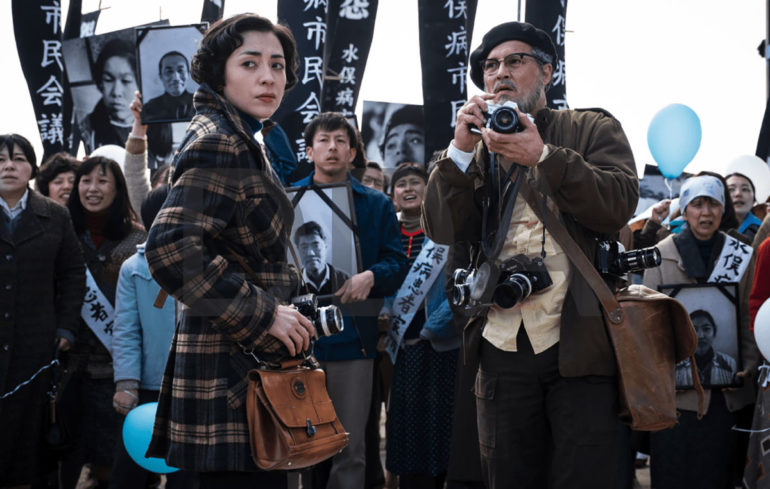Minamata is a biopic of photojournalist W. Eugene Smith, played by Johnny Depp. W. Eugene Smith was at the height of his game during World War II, but hasn’t done much since. He is now a washed-up alcoholic, with his glory days trailing far behind him. His children want nothing to do with him, he is broke and fairly unlikeable – in other words, he is perfectly set up for a Hollywood-style redemption arc.
Depp sits quite nicely in the role, playing the angst-filled, tortured artist role to a T. This is especially seen in the moments when Depp’s character is in the dark room developing photos. He gives those scenes an aesthetic energy, where he comes across so riveted and driven by the process. Sometimes it can be a bit much though, especially when he says things like: “I’m being nourished by my own hunger” when he refuses to be interrupted while in the midst of his work.
Eugene meets Aileen (Minami Hinase) in a happenstance moment regarding a Fujifilm contract which Eugene cannot follow through on because he only shoots in black and white. She informs him of a horrifying environmental situation in Minamata, a small Japanese fishing village. A corporation (Chisso) has been dumping mercury waste into the water, which is poisoning the fish, and as a result the humans who eat the fish are also suffering, having developed disfigurements. It is especially bad for the children born with the condition, since they absorbed all the poison from their mothers, so the Minamata disease is more widespread in them.
Eugene is initially reluctant to take on the story, but after seeing the materials she passed to him, he has a change of heart and storms into his editor Ralph Graves’ (Bill Nighy) office to demand that he be sent over so that more awareness can be brought to the cause the people of Minamata are fighting for.
Depp’s scenes with Nighy play on the typical dynamic that exists with editors and their journalists, with Depp’s character requesting Ralph to allow for something beyond the status quo and Ralph having to withstand such outbursts due to Eugene’s genius. There is nothing more to their interactions besides this same old merry-go-round, which is to the film’s detriment. Are such theatrics really how coverage for stories get the greenlight to go forward?
So Eugene heads over to Minamata, and when he starts taking photos, he realises that the images that would truly hit the hardest are the most difficult ones to get. These would be the pictures of the private spaces of the families affected, so no one would turn a blind eye to this atrocity anymore. The way the visuals of the film build into the actual pictures the real life Eugene took are the best parts of movie – we see the moving image in full colour before the transition into monochrome, glistening with poignancy.
The one that stands out amongst the rest is Tomoko in Her Bath, where Eugene photographs a mother lovingly bathing her daughter, a daughter crippled by the Minamata disease. Until now the image still lurks in my mind, the blend of beauty and horror captured in a single photograph.
Perhaps this is where director Andrew Levitas was going with the visuals of his own film, where we get such breathtaking visuals of Minamata’s landscape, even the scenes where the people are protesting are visually palatable – a consistent dance between beauty and horror to flesh out what human greed and capitalism has enacted upon the people of Minamata and the space they live in. The office spaces are also darker and more sterile in comparison, reflecting the detachment of the corporation in the face of human tragedy.
Minamata cements itself as an important film because it brings awareness to issues such as this, and shows us the power of journalism in a world that seems to be moving away from it. The problem is, there is not much nuance to the film itself. It is a very standard ‘power of the small’ narrative, where the common man stands up to a big corporation. Besides Depp, none of the characters are properly fleshed out, so none of the dynamics are especially compelling to watch. This is my lament with Minamata – for a film that depends so much on the human element to tell its story, it forgot to breathe life into the characters we were watching on screen, leaving us a film that scratches the surface but not much else.
Some of the coverage you find on Cultured Vultures contains affiliate links, which provide us with small commissions based on purchases made from visiting our site.


